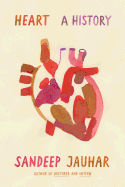
When Sandeep Jauhar (Doctored), director of the Heart Failure Program at Long Island Jewish Medical Center, discovers coronary plaque has partially obstructed his arteries, he gets "a glimpse of how I was probably going to die." Cardiovascular disease affects two-thirds of Americans; a third will die from it. It killed both of his grandfathers.
In Heart, Jauhar takes a journey through the organ--"muscular, constantly toiling, and yet so vulnerable at the same time"--which retains its mystery despite significant advances in the 20th century. Medical pioneers C. Walton Lillehei and John Heysham Gibbon made discoveries in cross-circulation, leading to the heart-lung machine that paved the way for open-heart surgery. It shocked the medical establishment when Werner Forssmann risked his own life by inserting a catheter in a vein in his arm and entering his heart; thanks to cardiac catheterization, angioplasty soon followed, saving countless lives. The nature of early experiments on animals (and occasionally humans) meant that death was a not-uncommon result. And the famous Framingham Heart Study, though flawed, revealed that chronic heart disease "is inextricably linked to the state of our neighborhoods, jobs, and families."
Jauhar's history of advances in treating heart disease is accentuated by his experiences with patients and his own family. His reflections are intimate and candid; he contemplates patients he lost and regrets the warning signs he missed among family members in distress. Heart shows that, even for a cardiologist, caring for the heart means treating the whole person. --Frank Brasile, librarian

